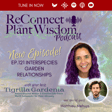
Ep.70 What Nature Teaches Us About Grief
In this episode, I explore the profound lessons nature offers us about navigating grief. Reflecting on the importance of giving ourselves the space and time to grieve, I draw parallels between the natural world and the human experience of loss. Just as plants go through cycles of growth and decay, we too must allow ourselves to process our emotions fully, embracing each stage of grief as a necessary part of our personal evolution.
By viewing grief through the lens of nature, we learn to approach it in a healthy and constructive way, metabolizing what serves us and letting go of what no longer fits.
I also delve into the metaphor of a functioning ecosystem, where everything that enters is either utilized or discarded to maintain balance. This concept mirrors our emotional journey—processing grief is essential to our well-being, helping us transform pain into growth.
Finally, I discuss the role of a supportive community in this process, highlighting the importance of connection and shared experience in fostering personal resilience. Join me as we uncover how nature’s wisdom can guide us through the complexities of grief, offering hope and healing along the way.
Topics Covered about grief
➡️ Grief and metabolization
➡️ Embracing anger as a natural response
➡️ Positive mental health
➡️ How ecosystems mirror healthy grieving
☝🏽ReConnect with Plant Wisdom podcast Ancient and modern knowledge from biology to spirituality about the wondrous ways plants help you lead a Naturally Conscious life. Subscribe on your favorite podcast player.
// Let's work together: book a Discovery Call
// EcoConscious Business Partners:
Learn and Be Amazed with Gaia
Shop Here
// Opening and Closing music by Steve Sciulli and Poinsettia from The Singing Life of Plants
// Socialize with me
Facebook | Instagram | LinkedIn | Youtube



















